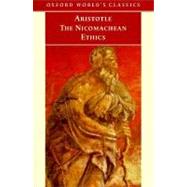
| INTRODUCTION | V | (19) | |||
| TRANSLATOR'S PREFACE | xxiv | (1) | |||
| NOTE ON THE REVISION | xxv | ||||
| BOOK I. THE GOOD FOR MAN | 1 | (27) | |||
|
1 | (1) | |||
|
|||||
|
|||||
|
2 | (2) | |||
|
|||||
|
4 | (20) | |||
|
|||||
|
|||||
|
|||||
|
|||||
|
|||||
|
|||||
|
|||||
|
|||||
|
|||||
|
24 | (4) | |||
|
|||||
| BOOK II. MORAL VIRTUE | 28 | (20) | |||
|
28 | (7) | |||
|
|||||
|
|||||
|
|||||
|
|||||
|
35 | (8) | |||
|
|||||
|
|||||
|
|||||
|
43 | (5) | |||
|
|||||
|
|||||
| BOOK III. MORAL VIRTUE (cont.) | 48 | (31) | |||
|
48 | (15) | |||
|
|||||
|
|||||
|
|||||
|
|||||
|
|||||
|
63 | (9) | |||
|
|||||
|
|||||
|
|||||
|
|||||
|
72 | (7) | |||
|
|||||
|
|||||
|
|||||
| BOOK IV. MORAL VIRTUE (cont.) | 79 | (27) | |||
|
79 | (10) | |||
|
|||||
|
|||||
|
89 | (7) | |||
|
|||||
|
|||||
|
96 | (2) | |||
|
|||||
|
98 | (6) | |||
|
|||||
|
|||||
|
|||||
|
104 | (2) | |||
|
|||||
| BOOK V. MORAL VIRTUE (cont.) | 106 | (31) | |||
|
106 | (19) | |||
|
|||||
|
|||||
|
|||||
|
|||||
|
|||||
|
|||||
|
|||||
|
125 | (12) | |||
|
|||||
|
|||||
|
|||||
|
|||||
| BOOK VI. INTELLECTUAL VIRTUE | 137 | (22) | |||
|
137 | (3) | |||
|
|||||
|
|||||
|
140 | (9) | |||
|
|||||
|
|||||
|
|||||
|
|||||
|
|||||
|
|||||
|
149 | (5) | |||
|
|||||
|
|||||
|
|||||
|
154 | (5) | |||
|
|||||
|
|||||
| BOOK VII. CONTINENCE AND INCONTINENCE: PLEASURE | 159 | (33) | |||
|
159 | (24) | |||
|
|||||
|
|||||
|
|||||
|
|||||
|
|||||
|
|||||
|
|||||
|
|||||
|
|||||
|
|||||
|
183 | (9) | |||
|
|||||
|
|||||
|
|||||
|
|||||
| BOOK VIII. FRIENDSHIP | 192 | (28) | |||
|
192 | (11) | |||
|
|||||
|
|||||
|
|||||
|
|||||
|
|||||
|
|||||
|
203 | (4) | |||
|
|||||
|
|||||
|
207 | (8) | |||
|
|||||
|
|||||
|
|||||
|
|||||
|
215 | (5) | |||
|
|||||
|
|||||
| BOOK IX. FRIENDSHIP (cont.) | 220 | (28) | |||
|
|||||
|
|||||
|
|||||
| Internal nature of friendship | 227 | (11) | |||
|
|||||
|
|||||
|
|||||
|
|||||
|
|||||
| The need of friendship | 238 | (10) | |||
|
|||||
|
|||||
|
|||||
|
|||||
| BOOK X. PLEASURE, HAPPINESS | 248 | (29) | |||
|
248 | (13) | |||
|
|||||
|
|||||
|
|||||
|
|||||
|
|||||
|
261 | (16) | |||
|
|||||
|
|||||
|
|||||
|
|||||
| INDEX | 277 |
The New copy of this book will include any supplemental materials advertised. Please check the title of the book to determine if it should include any access cards, study guides, lab manuals, CDs, etc.
The Used, Rental and eBook copies of this book are not guaranteed to include any supplemental materials. Typically, only the book itself is included. This is true even if the title states it includes any access cards, study guides, lab manuals, CDs, etc.